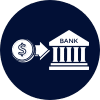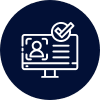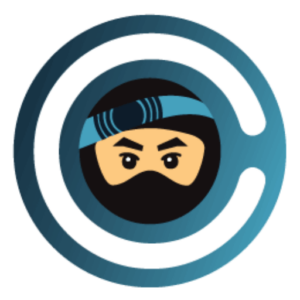Why Choose CreditNinja for Your Unsecured Installment Loan?
CreditNinja is a superior online lender that provides fast unsecured loans. We are the preferred solution when traditional loans are not an option. We offer an easy online application process that lets you know if you qualify right away. Qualified borrowers may get their money directly deposited the same day!*

Easy to Apply
It’s easy to apply for an unsecured personal loan. Simply complete our online application form with basic personal information. Most applicants are able to finish the application within a few minutes!

Same-Day Funding
At CreditNinja, we know that speed is critical. That’s why we work hard so borrowers may get same day funding.* Unlike other lenders, we won’t make you wait days to get emergency cash.

Low Credit Support
You may still be eligible for an unsecured loan with bad credit. At CreditNinja, we consider various factors for approval. If traditional loans are not an option for you, we may be the solution.

Direct Deposit
Once you are approved for a personal loan, your money will be sent to your savings or checking account via direct deposit. Most borrowers get their money in their direct deposit account the same day!*

Find Out if You Qualify Fast
Applicants can find out if they qualify for an unsecured loan quickly. We offer same day qualification decisions so you can work on getting your money as soon as possible.*

Get Your Money Quickly
If you are approved for a personal loan, you could get your money the same day!* We provide ninja fast funding so you can get financial relief when you need it most.
What is an Unsecured Personal Loan?
An unsecured personal loan is an installment loan that does not require the borrower to provide collateral. This type of personal loan is different from a secured loan, which requires a security deposit. A secured loan is financially risky to the borrower, so financial experts generally advise against them.
CreditNinja unsecured loans are different from other loan options because we prioritize our customers. Unlike the other guys, we pride ourselves on quality customer service and offer exclusive benefits. Our perks include fast funding, flexible repayment, affordable monthly payments, and competitive APR.
How to Apply for CreditNinja Unsecured Personal Loan?
You can apply for a CreditNinja personal loan at any time on your desktop or mobile device. If you meet our minimal requirements, you could get your money deposited into your eligible cash management account that same day.*
Here is how it works:

Apply Online Easily
Complete and submit our simple online form to apply.

Income Verification
We verify your income through a secure Bank Verification process.

Same-Day Funding
Eligible borrowers may get funding the same day.*
What CreditNinja Loan Customers are Saying
Reviews are important because they highlight what current and past customers think about a company. Here’s a snapshot of how CreditNinja customers have benefited from unsecured personal loans and what they love about us.
|
I so appreciate how easy the process was. Thanks! – Cathy |
Very easy to apply and the verification went smoothly. – Veronica |
I have used NINJA loans in the past and they have great rates for emergency loans
That’s why I keep using them. – Miguel |
CreditNinja Online Rates and Repayment
CreditNinja offers manageable monthly payments for every customer. While other lenders may stick to a preset loan package, we understand that your financial situation is unique. That’s why we provide a personal loan offer that works with your budget.
- Loan Amounts — Personal loans range from $300 to $5,000. They can be used for debt consolidation, repairs, medical bills, and much more.
- Flexible Repayment — Flexible repayment up to 24 months. Enabled payroll direct deposits can help you conveniently repay your loan and avoid late fees.
- Minimum Credit Score — No minimum credit score required to apply. You may be eligible despite having a bad credit history.
- Fees — There are no prepayment penalties or hidden fees.
Below are some average loan amounts and repayment details you may come across for CreditNinja personal loans:
| Loan Amount Ranges | Flexible Repayment |
|---|---|
| $300 – $5,000 | Up to 24 months |
Frequently Asked Questions
How do you apply for an online unsecured loan?
You can apply for an online unsecured loan by going to CreditNinja’s website and completing the quick and easy online application form. We only ask for basic information to verify your identity and eligibility.
How quickly can you get a loan from CreditNinja?
You may get your CreditNinja personal loan money the same day you apply.* It takes almost no time for us to make an approval decision. And it’s even possible to qualify with a less-than-perfect credit history.
What’s the difference between unsecured and secured loans?
The main difference between unsecured and secured loans is the requirement of collateral. Unsecured loans don’t require borrowers to provide any kind of collateral during the approval process. Secured loans, however, may require borrowers to use the equity in their home or vehicle as collateral in order to receive loan approval.
How much money can I qualify for?
Eligible borrowers may qualify to get a loan between $300 and $5,000. However, the loan proceeds you actually receive depend on your state, creditworthiness, income, and other factors. Keep in mind that a higher loan amount will result in higher monthly payments.
What is the typical interest rate?
Our interest rates are competitive and fluctuate with the market. Borrowers need to apply in order to get a personalized APR offer.
Can you apply for unsecured loans if you have bad credit?
You can apply for CreditNinja unsecured loans despite having a bad credit score. We offer an alternative to loans for bad credit. When approving loans, we consider various factors, not just your credit score.
What documents do you need to supply?
You do not need to provide any physical documents to apply for CreditNinja personal loans. The process is done entirely online, so all you have to do is provide a few key pieces of information through our quick application form.
What can you use an unsecured loan for?
Unsecured personal loans can be used for all types of unexpected expenses. Debt consolidation is one of the most common reasons that customers get a loan, since consolidating credit card debt may result in better rates and lower monthly payments. However, borrowers also use unsecured loans for car repairs, medical bills, childcare costs, and much more.
Is guaranteed approval possible for unsecured loans?
Guaranteed approval for unsecured loans is not possible because every lender, even CreditNinja, conducts some form of risk analysis when approving loans. However, we do not base approval entirely on your creditworthiness. We consider other factors as well, such as your income and outstanding debt.
Still Have Questions? Contact CreditNinja Today
CreditNinja is here for all your needs. With a CreditNinja personal loan, you may get fast funding for car repairs, urgent situations, medical procedures, and much more.
Don’t hesitate to call us today if you have any questions. We’d be happy to talk to you about loan amounts, APRs, debt consolidation plans, or anything else.
Bad Credit Loans | Balance Transfer Loans | Co-Signed Loans | Credit Card Consolidation Loans | Debt Consolidation Loans | Installment Loans | No Credit Check Loans | Payday Loans | Quick Cash Loans | Secured Personal Loans | Short Term Loans | Title Loans | Unsecured Personal Loans | Variable Rate Loans

CreditNinja is your trusted source for quality personal finance information. With a demonstrated history of helping borrowers in need, CreditNinja makes your financial growth and understanding our top priority. Whether you want to learn more about budgeting, saving, credit cards, or personal loans, at CreditNinja we are here to help.

